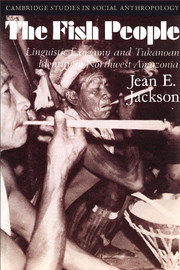Book contents
- Frontmatter
- Contents
- List of figures, maps, and tables
- Preface
- Acknowledgments
- Note on orthography
- 1 Purpose and organization of the book
- 2 Introduction to the Central Northwest Amazon
- 3 The longhouse
- 4 Economic and political life
- 5 Vaupés social structure
- 6 Kinship
- 7 Marriage
- 8 Tukanoans and Makú
- 9 The role of language and speech in Tukanoan identity
- 10 Male and female identity
- 11 Tukanoans' place in the cosmos
- 12 Tukanoans and the outside world
- 13 Conclusions: themes in Tukanoan social identity
- Notes
- Glossary
- References
- Index
- CAMBRIDGE STUDIES IN SOCIAL ANTHROPOLOGY
1 - Purpose and organization of the book
Published online by Cambridge University Press: 05 June 2012
- Frontmatter
- Contents
- List of figures, maps, and tables
- Preface
- Acknowledgments
- Note on orthography
- 1 Purpose and organization of the book
- 2 Introduction to the Central Northwest Amazon
- 3 The longhouse
- 4 Economic and political life
- 5 Vaupés social structure
- 6 Kinship
- 7 Marriage
- 8 Tukanoans and Makú
- 9 The role of language and speech in Tukanoan identity
- 10 Male and female identity
- 11 Tukanoans' place in the cosmos
- 12 Tukanoans and the outside world
- 13 Conclusions: themes in Tukanoan social identity
- Notes
- Glossary
- References
- Index
- CAMBRIDGE STUDIES IN SOCIAL ANTHROPOLOGY
Summary
The social system of the Tukanoans of the Central Northwest Amazon has intrigued virtually every scholar who has come into contact with it. Each of the more than sixteen languages spoken there is identified with a named descent group. Although these groups have sometimes been called tribes, they are rather strange tribes. For one thing, with a few exceptions, they are exogamous. This book is intended as a general introduction to the Vaupés, the Colombian sector of the Central Northwest Amazon, and more specifically to Tukanoan social identity.
To a considerable extent, the book's conception and organization reflect the way Tukanoans organize their social world. Most of the chapter topics derive from categories and distinctions Tukanoans themselves make among kinds of people and among other kinds of beings in their universe. By providing clues about the essence of being Tukanoan, these categories offer a logical starting point for discovering the content and organization of Tukanoan social identity, as Tukanoans conceptualize it and as they reveal it in their behavior. The general progression of chapters can be understood if we imagine ourselves to be looking at Tukanoan society through a series of lenses, each successive lens of lower power than the preceding one and thus encompassing units and categories of increasing scale and magnitude. The geographical scope of an image increases chapter by chapter, beginning with the traditional local unit, the longhouse, and ending with the entire Tukanoan universe.
- Type
- Chapter
- Information
- The Fish PeopleLinguistic Exogamy and Tukanoan Identity in Northwest Amazonia, pp. 1 - 12Publisher: Cambridge University PressPrint publication year: 1983



